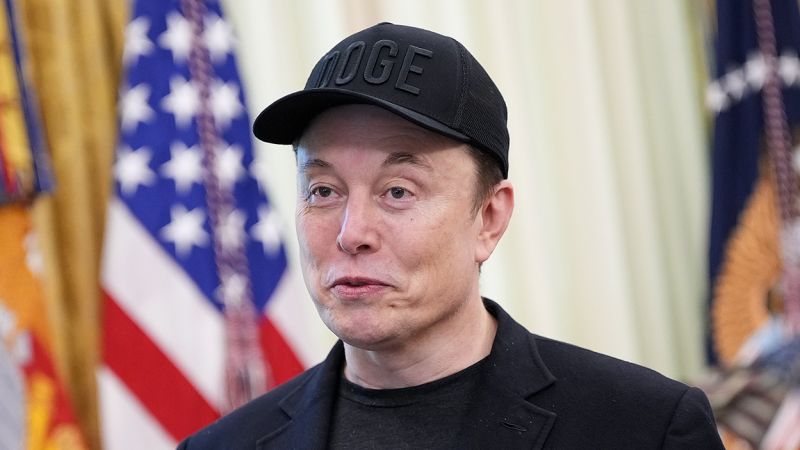In a recent development that has caused considerable upheaval in the stock market, shares in Tesla Inc. (ticker symbol: TSLA) plummeted by as much as 7.6% in pre-market trading on Monday morning. This downward spiral followed remarks made by the company’s CEO, Elon Musk, who announced his plans to establish a new political party in the United States. This announcement was met with a fierce reaction from former President Donald Trump, who expressed his disapproval on his social media platform, Truth Social.
Tesla’s stock managed to recover slightly, but by 7:48 a.m. ET, it was still down approximately 6.5%. Trump, evidently perturbed by Musk’s recent announcements, referred to the CEO’s actions as a “TRAIN WRECK,” sharing his sentiments about Musk’s apparent deviation from rationality over the previous weeks. Musk’s intention to form a political entity aimed at challenging the existing two-party system, dominated by the Republicans and Democrats, was labeled as “ridiculous” by Trump, who claimed it could lead to confusion among voters.
Neil Wilson, a strategist at Saxo Markets, pointed out the dual concerns facing Tesla investors. The apprehension stems from two main worries: first, that the growing clash between Musk and Trump might result in further reductions to U.S. government subsidies for electric vehicles (EVs); and second, that Musk appears increasingly “distracted” by his political ambitions. Investors were initially relieved when Musk seemed to withdraw from frontline politics, but now there are fears that he might become entangled in this new political venture, diverting his attention away from Tesla and its operational priorities.
The animosity between Musk and Trump ignited in early June when Musk publicly criticized Trump’s controversial “Big, Beautiful Bill,” which was a significant tax and domestic policy reform that the former president had signed into law. Musk argued that such policies would exacerbate the U.S. federal budget deficit, which led to further tension between the two influential figures. On Saturday, Musk remarked on his platform X, claiming, “Today, the America Party is formed to give you back your freedom,” insinuating that the current political landscape does not truly represent the people’s interests.
In response to Musk’s political aspirations, Trump commented on the historic ineffectiveness of third parties in the U.S., suggesting that they foster chaos and disruption rather than progress. This interaction underscores not only the conflict between two powerful personalities but also highlights the ramifications of Musk’s political foray on Tesla’s performance in the market.
Tesla’s position in the automotive landscape has been troubling in recent months, primarily due to rising competition from other EV manufacturers and the fallout from Musk’s political engagements. The company recently reported a striking 13.5% decline in vehicle sales for the second quarter of 2024 compared to the previous year, marking it as the first recorded annual decline in sales since becoming publicly traded. Although the decline was a mere 1%, it signifies a notable shift for a company that has been known for its progressive sales growth.
Additionally, Tesla is at risk of losing its crown as the world’s largest EV manufacturer by annual sales to the Chinese company BYD, which has not yet entered the U.S. market. This competitive pressure, aligned with Musk’s recent political controversies and management issues within the company, has led to widespread protests at Tesla’s showrooms globally.
This complex situation has been exacerbated by Musk’s leadership role within the U.S. government, particularly his direction of the Department of Government Efficiency, which has included significant layoffs of federal workers. While Musk indicated in May that he would resign from his governmental position, sparking hopes for increased focus on his various enterprises such as SpaceX and the social media platform X, the ongoing feud with Trump and his ambitions for a new political party have thrust him back into the political spotlight.
As a consequence, Tesla’s stock has seen significant declines, dropping nearly 23% year-to-date. Investors are left grappling with uncertainty, facing the complex intertwined futures of both Musk’s political endeavors and Tesla’s positioning in a rapidly evolving electric vehicle market.











